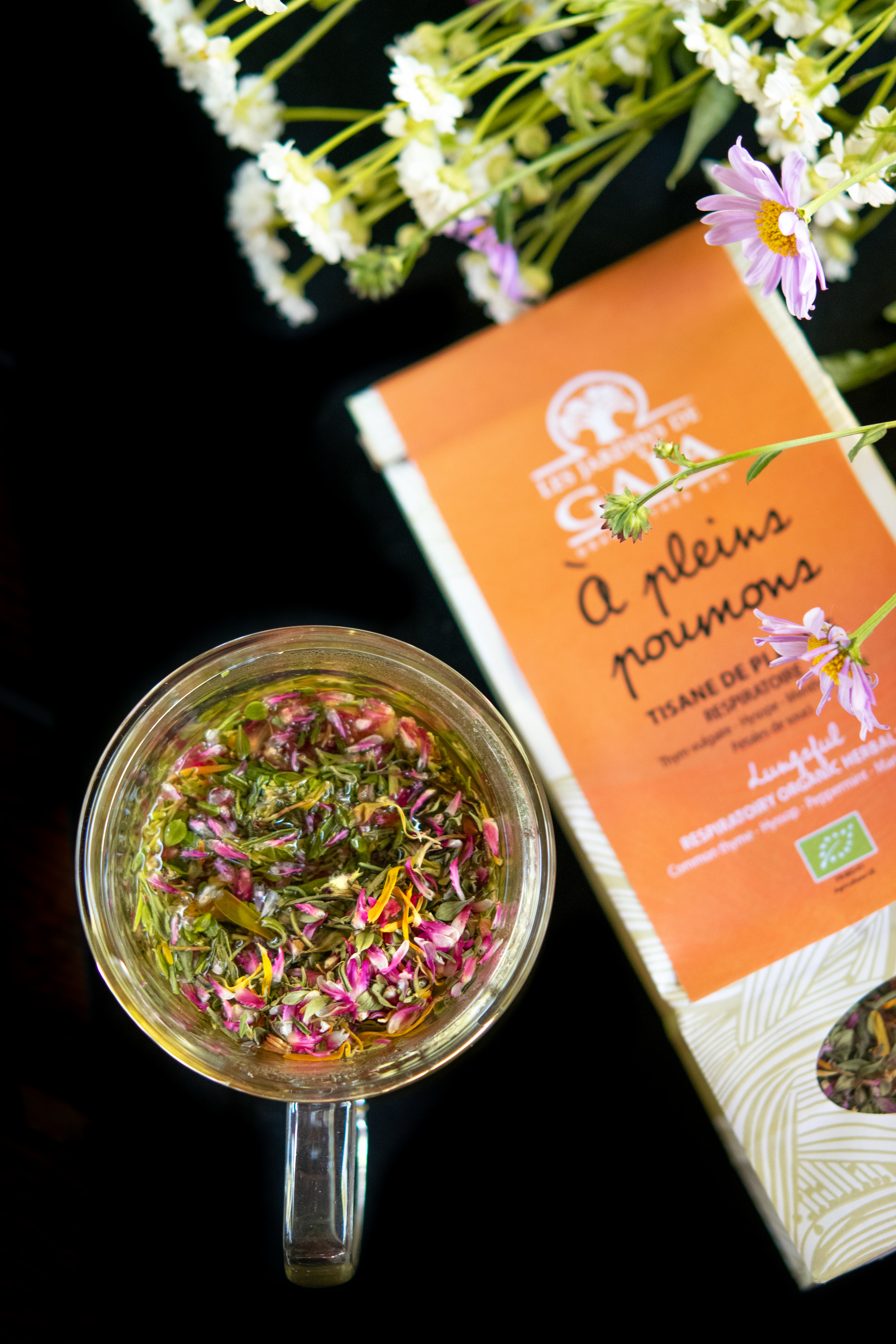Sommaire
- Can you sum up your career path in a few words?
- How did you come up with the idea of dedicating yourself to the production of medicinal plants and organic herbal teas?
- Your plants are particularly beautiful, colourful and aromatic. What’s your secret?
- Can you tell us the main characteristics of your terroir?
- What are your plans for the future?
- A partnership that from the outset was designed on the principles of fair trade
New herbal teas: benefits, flavours and an exceptional partnership

Our six new organic herbal teas are aimed at everyone who wants to take care of their body and soul, while enjoying a delicious drink. Does that sound like you?
Invigorating, antioxidant, good for the digestion and the respiratory system, anti-inflammatory and calming: the benefits are self-evident and the flavours are exhilarating. Their names speak for themselves: Powerful, Healthy Glow, Tummy tum-Tum, Dragon’s Agility, Take it Easy and Lungful.
These new products contain plants and flowers grown with passion and expertise by Carlos, a small organic producer, in a nature reserve in central-east Portugal. This exceptional biodiversity and the exclusive partnership that has brought us together via herbal teas, guarantee infusions that are as full of flavour as they are high in quality!
At Jardins de Gaïa, a long-term commitment to our partner-producers is one of the keys to enduring success in an agricultural sector beset by many uncertainties. The partnership with Carlos is no exception to this rule!
In this interview, he talks about his terroir, his plants and his venture…

Can you sum up your career path in a few words?
It’s closely linked to my own personal journey. My parents, who are Portuguese, came to France in the 1970s and I was born in Maine-et-Loire.
I did all my schooling in France and had a short stint working in the food sector before starting my career in the car industry. As an industrial designer, I had to travel regularly to Portalegre, a few kilometres from where my farm is today. After 10 years travelling back and forth; I requested a transfer to the town.
I had finally found the lifestyle I was looking for, but something was missing: being close to nature. I had a real yearning to be in touch with nature and freedom. Things happened very quickly and really quite naturally …
I spent two years doing a lot of research to set up my farming business, then I applied for a European grant and in 2016, I started growing three species on two hectares of land: peppermint, verbena and lemon thyme; plants that seemed to me to have the most potential to start with and which grow very easily in Portugal.
How did you come up with the idea of dedicating yourself to the production of medicinal plants and organic herbal teas?
I think it was the nature of my plot of land and living in the Portuguese sun that made me decide to produce organic aromatic and medicinal plants. Out of curiosity, I had already experimented with about 20 plants in a corner of my garden when I moved there. These tests made a compelling case…
Aromatic plants grow particularly well there, in the sunny, shady, rocky and damp areas.
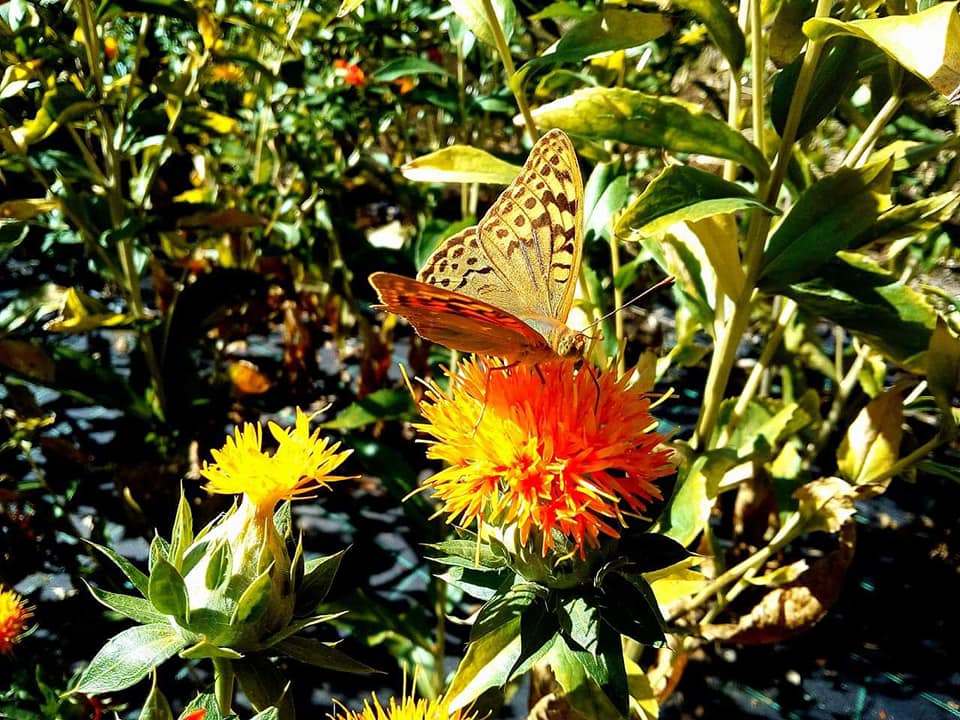
Today, I produce around 30 different plants including the classic thyme, mint, basil and dill, but also a beautiful verbena, mallow flowers, sunflower, hyssop, stevia, etc.
Last year I increased my production area to three hectares. I have maximised my production by growing medicinal plants, mainly arnica, in the less accessible places.
I produce all the other plants almost exclusively for Les Jardins de Gaïa, who have the exclusive rights for France. And it’s a real pleasure to have established a link with this French company that shares my values.
Your plants are particularly beautiful, colourful and aromatic. What’s your secret?
The first thing is the land of course, but to know how to get the best out of it it, you have to be highly organised, a quality that I have carried over from my time in industry.
I pay particular attention to choosing the right moment to harvest and the way the plants are dried.
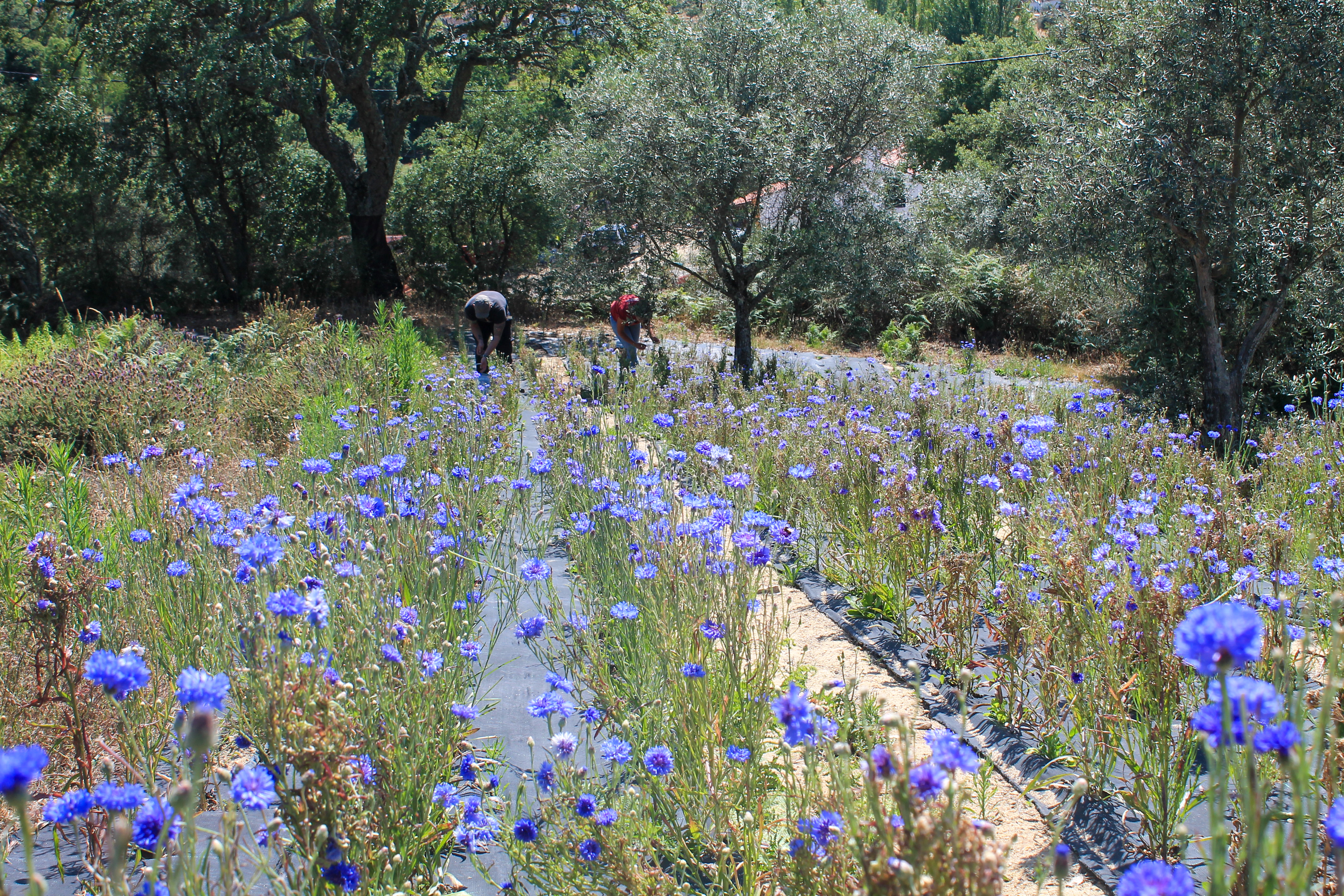
The point at which the plants are cut determines their aromatic strength: the later the plant is cut, the more aromatic it becomes. However, you shouldn’t wait too long, as flowering reduces production considerably and affects its appearance. To obtain the maximum flavour while keeping the aesthetic qualities of beautiful colours, a fresh, vibrant appearance and a good structure, you have to know how to cut at the right time. And that can’t be learned from books.
The way the plants are dried is also extremely important. You need a well-ventilated room and the right equipment to quickly remove as much moisture as possible. I have three dryers, two of which are forced air ones, with fans and dehumidifiers. A console connected to probes allows me to take several measurements, but ultimately I only take note of two: humidity and temperature. Everything else I do mainly « by touch » by feeling the plants with my hands which allows me to tell immediately, judging by the colour and the smell, if the plant is properly dried.
With experience, I have learned to trust my senses and have direct contact with the product for much better results and especially to avoid any losses.
In my opinion, it is this careful attention to choosing the perfect moment for cutting and drying that lies at the heart of the quality. These are technical aspects that I learned on the job and this is what enables me to achieve the optimal balance between flavour and appearance.
Can you tell us the main characteristics of your terroir?
I have the good fortune to work on a wonderful piece of land to the north of the Serra de São Mamede Natural Park, a protected area in the northeastern border region of Alentejo.
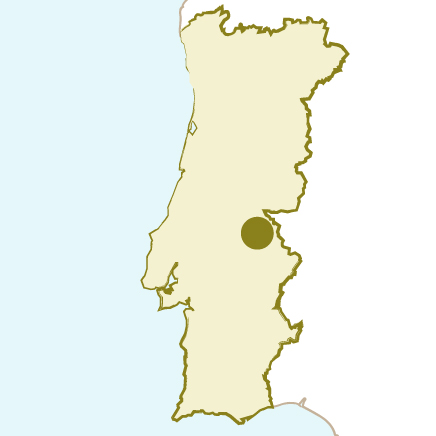
It is at significant altitude. The highest point on my farm is 600 metres above sea level, which affects temperatures, humidity and wind. And despite the scorching summers of Alentejo, one of the hottest regions in Portugal with temperatures that can reach over 40°C, I am lucky that it is always cool in my fields.
In winter, due to the altitude and the surrounding landforms, we frequently experience snow and frost and the northern orientation in this higher part of the park also provides a higher amount of rain and constant humidity.
The fact that there are cork oak trees all over my land also helps mitigate the effects of heatwaves. Finally, several natural springs and a stream cross the estate, which is a huge asset with wetlands in the lower part of the stream which are particularly good for peppermint and certain flowers which need water and shade …
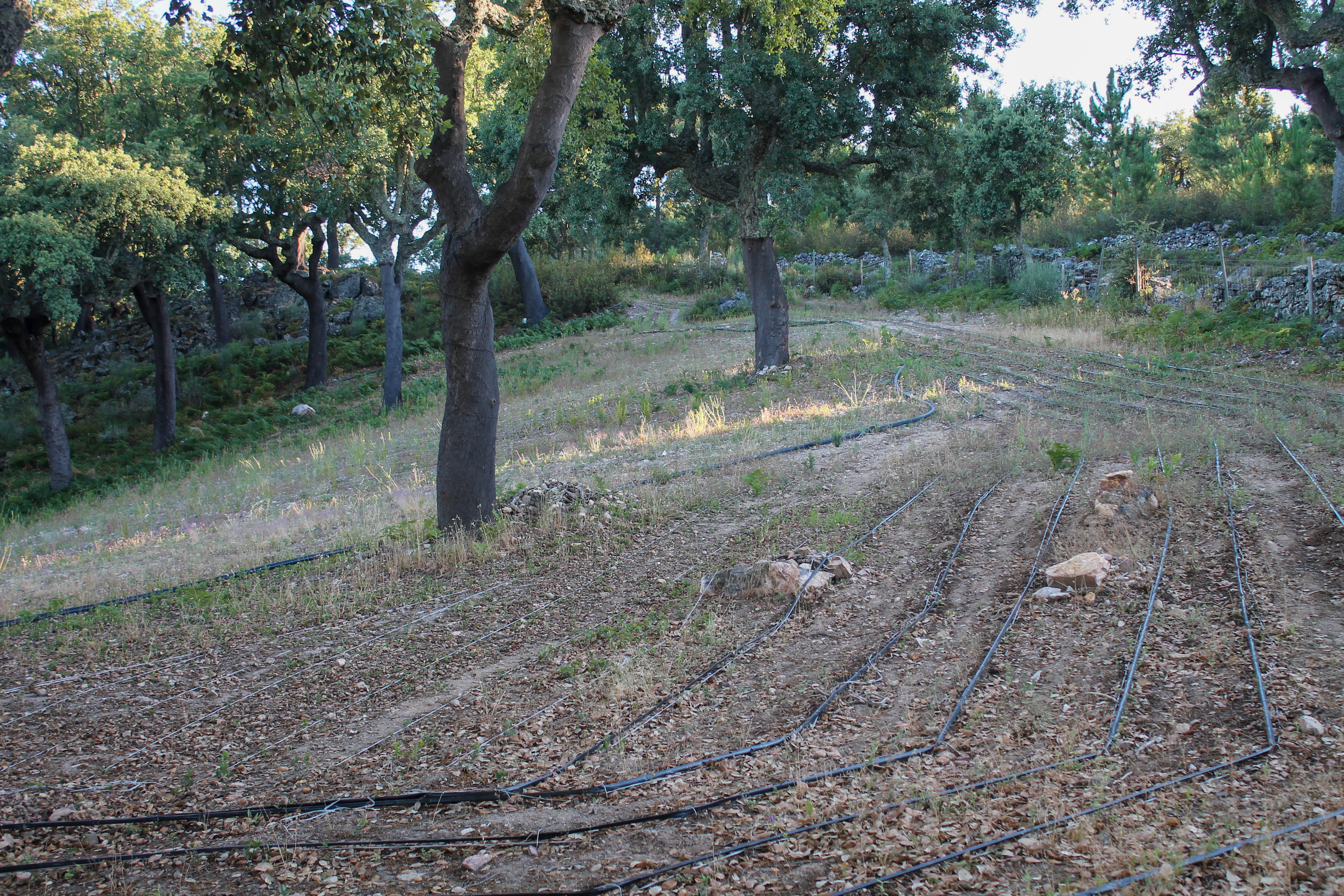
Finally, there are different types of soil: sandy and rocky higher upstream with a lot of quartz, natural terraced areas that look a bit like Asian rice fields and more clay areas downstream. One of the main characteristics of my land is the presence of lots of organic matter: tons of cork oak leaves and acorns provide a thick layer of humus every year. In addition to nourishing the plants, this humus helps to retain moisture around their roots and limits the growth of weeds. This makes a truly natural mulch, provided for me by nature!
As a result of these different characteristics that were part of the land when I acquired it, I have learned to adapt by, for example, growing a lot of flowers with tall stems directly under the cork oaks, because I can then easily harvest the flower without the leaves on the ground being a problem. If lemon thyme were planted there, its bushy shape would catch all the leaves, and this would make picking it much more complicated.
What are your plans for the future?
So many things continue to be put in place with Jardins de Gaia which represent 90% of my production, with new varieties of plants, larger quantities, the creation of new products etc.
To keep up with increasing demand, my aim is to extend my production area, which will generate a lot of work and investment.
I am planning to expand my business over 5.5 hectares and would like to create terraces with stone walls in the steeper areas, which would naturally regulate heat, humidity and provide additional minerals to the soil.
As for new plants, despite the difficulties this represents, I am considering growing turmeric, ginger, hibiscus, liquorice and passionflower. I am currently experimenting with these plants and I am having fun with it – I gives me a lot of enjoyment.
Finally, I am in the process of converting to biodynamic agriculture which is a method of production I am really drawn to with its more holistic and nature-friendly approach. It allows me to have a real connection with my plants and my land to which I am becoming more and more attached.
A partnership that from the outset was designed on the principles of fair trade
You will no doubt have realised that the reason we made a commitment to this Portuguese producer is because right from the start we were able to envisage the possibility of working together hand in hand, for many years. This would follow the example of the lasting relationships that we have with our tea and rooibos producer partners. With Carlos, as with our producer organisations, we provide pre-financing of crops, a long-term contract (three years minimum renewable) and a fair purchase price that respects fair trade standards.
Écrit par Les Jardins de Gaïa
Pionniers sur le marché des thés et tisanes bio et équitables, Les Jardins de Gaïa proposent, depuis 1994, des grands crus nature, des classiques et des créations maison originales. Privilégiant les petits producteurs et les récoltes manuelles, ils ont développé au fil des années une gamme généreuse et variée de thés, rooibos et tisanes aux qualités gustatives reconnues, ainsi qu’une gamme d’épices bio et prémiums proposée sous la marque Terra Madre. Tel un jardin épanoui, la force des Jardins de Gaïa tient dans la diversité des terroirs et l’engagement des hommes qui la travaillent…
